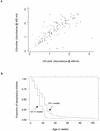Lack of association between maternal antibody and protection of African infants from malaria infection
- PMID: 10992495
- PMCID: PMC101547
- DOI: 10.1128/IAI.68.10.5856-5863.2000
Lack of association between maternal antibody and protection of African infants from malaria infection
Abstract
Maternally derived antibodies are believed to protect infants against infection, but there is little direct evidence for a protective role of passively acquired antibodies against malaria. A longitudinal study of malaria infection in 143 infants was conducted in a region of southern Ghana where Plasmodium falciparum is endemic. Infants born in the high-transmission season were less likely to become infected in the first 20 weeks of life than children born in the low-transmission season. Plasma, obtained at birth, was tested for immunoglobulin G (IgG) and IgG subclasses to P. falciparum schizonts and recombinant circumsporozoite antigen, MSP-1(19), MSP-2, AMA-1, and Pf155 (also called ring-infected erythrocyte surface antigen). Antibody levels at birth were not associated with resistance to malaria infection. On the contrary, antibodies at birth were positively associated with infection, indicating that high levels of maternally derived antibodies represent a marker for intensity of exposure to malaria infection in infants. However, all five children who experienced high-density infections (>100 parasites/microl of blood) were seronegative for MSP-1(19) at the time of infection.
Figures



References
-
- Achidi E A, Salimonu L S, Perlmann H, Perlmann P, Berzins K, Williams A I O. Lack of association between levels of transplacentally acquired Plasmodium falciparum-specific antibodies and age of onset of clinical malaria in infants in a malaria endemic area of Nigeria. Acta Trop. 1996;61:315–326. - PubMed
-
- Afari E A, Appawu M A, Dunyo S, Baffoe-Wilmot A B A, Nkrumah F K. Malaria infection, morbidity and transmission in two ecological zones in Southern Ghana. Afr J Health Sci. 1995;2:312–316. - PubMed
-
- Al-Yaman F, Genton B, Anders R F, Falk M, Triglia T, Lewis D, Hii J, Beck H-P, Alpers M P. Relationship between humoral response to Plasmodium falciparum merozoite surface antigen-2 and malaria morbidity in a highly endemic area of Papua New Guinea. Am J Trop Med Hyg. 1994;51:593–602. - PubMed
-
- Al-Yaman F, Genton B, Anders R, Taraika J, Ginny M, Mellor S, Alpers M P. Assessment of the role of the humoral response to Plasmodium falciparum MSP2 compared to RESA and SPf66 in protecting Papua New Guinean children from clinical malaria. Parasite Immunol. 1995;17:493–501. - PubMed
-
- Al-Yaman F, Genton B, Kramer K J, Chang S P, Hui G S N, Baisor M, Alpers M P. Assessment of the role of naturally acquired antibody levels to Plasmodium falciparum merozoite surface protein-1 in protecting Papua New Guinean children from malaria morbidity. Am J Trop Med Hyg. 1996;54:443–448. - PubMed
Publication types
MeSH terms
Substances
Grants and funding
LinkOut - more resources
Full Text Sources
Research Materials

